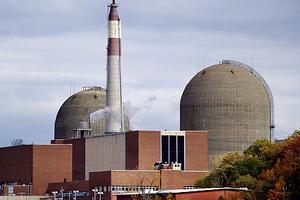Nuclear mattersFuture of U.S. nuclear plans uncertain after Japanese nuclear crisis
As Japan continues its struggle to control its nuclear reactors, the future of the U.S. nuclear industry has become increasingly uncertain; nuclear power had emerged as the bipartisan solution to easing America’s dependency on oil; in February 2010, President Obama announced $8.3 billion in loan guarantees to energy companies to build the first new nuclear power plants in the United States in almost thirty years; some lawmakers have called for a moratorium and stricter safety regulations, while others are urging for a more measured response; Energy Secretary Stephen Chu and Gregory B. Jaczko, the chairman of the Nuclear Regulatory Commission, will testify before the House Energy and Commerce committee on Wednesday

Japan's disaster raises concerns about U.S. nuclear safety // Source: presstv.ir
As Japan continues its struggle to control its nuclear reactors in the wake of a massive 8.9 magnitude earthquake, the future of the U.S. nuclear industry has become increasingly uncertain.
In recent years nuclear power had emerged as the bipartisan solution to easing America’s dependency on oil and was a linchpin in the Obama administration’s push for clean energy legislation. But Japan’s increasing troubles with its reactors have cast a shadow on the fate of U.S. nuclear energy plans and raised safety concerns once more. After an accident in Pennsylvania’s Three Mile Island power plant in 1979, the United States has largely avoided the topic of nuclear power in energy discussions. But in recent years, nuclear power has gained more traction politically.
In February 2010, President Obama announced $8.3 billion in loan guarantees to energy companies to build two new reactors in Georgia, the first new plants to be built in the United States in almost thirty years.
On Sunday in reaction to the events in Japan,Senator Joseph Lieberman (I – Connecticut), an active voice on climate change legislation, said, “I think it calls on us here in the U.S., naturally, not to stop building nuclear power plants but to put the brakes on right now until we understand the ramifications of what’s happened in Japan.”
Meanwhile Sweden announced on Monday that it intends to shut down its nuclear power program and Germany declared that it would suspend its nuclear energy plans for three months. Both governments cited safety concerns as a result of the events in Japan.
The earthquake that rocked Japan badly damaged electrical infrastructure at four nuclear plants that powered critical cooling systems. Now officials are struggling to control the rapidly overheating reactors and prevent a meltdown that would release devastating amounts of radiation.
Last week, in a desperate attempt, officials flooded two reactors at the Fukushima-Daiichi plant, roughly 150 miles northeast of Tokyo, with seawater mixed with boric acid to cool them down. Over the weekend one reactor exploded, releasing radioactive material into the air, while on Monday and early Tuesday morningtwo more reactors exploded.
Officials believe that the three reactors which exploded have suffered partial meltdowns, which could eventually lead to a disastrous full meltdown. The containment units, which prevent large quantities of radiation from escaping, are still intact.
Chief Cabinet Secretary Yukio Edano said, “I have received reports that the containment vessel is sound. I understand that there
